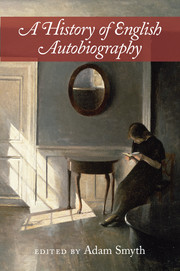Book contents
- Frontmatter
- Dedication
- Contents
- List of contributors
- 1 Introduction: The range, limits, and potentials of the form
- PART 1 AUTOBIOGRAPHY BEFORE ‘AUTOBIOGRAPHY’ (CA. 1300–1700)
- PART 2 RELIGION, GENDER, THINGS (CA. 1700–1800)
- PART 3 THE MANY NINETEENTH CENTURIES (CA. 1800–1900)
- 12 Working-class autobiography in the nineteenth century
- 13 Romantic life-writing
- 14 Nineteenth-century spiritual autobiography: Carlyle, Newman, Mill
- 15 Emerging selves: The autobiographical impulse in Elizabeth Barrett Browning, Anne Thackeray Ritchie, and Annie Wood Besant
- 16 Victorian artists’ autobiographies: Transgression, res gestae, and the collective life
- 17 Victorian print culture: Periodicals and serial lives, 1830–1860
- PART 4 RELATIONAL LIVES AND FORMS OF REMEMBERING (CA. 1890–1930)
- PART 5 KINDS OF COMMUNITY (CA. 1930-CONTEMPORARY)
- Index
- References
15 - Emerging selves: The autobiographical impulse in Elizabeth Barrett Browning, Anne Thackeray Ritchie, and Annie Wood Besant
from PART 3 - THE MANY NINETEENTH CENTURIES (CA. 1800–1900)
Published online by Cambridge University Press: 05 March 2016
- Frontmatter
- Dedication
- Contents
- List of contributors
- 1 Introduction: The range, limits, and potentials of the form
- PART 1 AUTOBIOGRAPHY BEFORE ‘AUTOBIOGRAPHY’ (CA. 1300–1700)
- PART 2 RELIGION, GENDER, THINGS (CA. 1700–1800)
- PART 3 THE MANY NINETEENTH CENTURIES (CA. 1800–1900)
- 12 Working-class autobiography in the nineteenth century
- 13 Romantic life-writing
- 14 Nineteenth-century spiritual autobiography: Carlyle, Newman, Mill
- 15 Emerging selves: The autobiographical impulse in Elizabeth Barrett Browning, Anne Thackeray Ritchie, and Annie Wood Besant
- 16 Victorian artists’ autobiographies: Transgression, res gestae, and the collective life
- 17 Victorian print culture: Periodicals and serial lives, 1830–1860
- PART 4 RELATIONAL LIVES AND FORMS OF REMEMBERING (CA. 1890–1930)
- PART 5 KINDS OF COMMUNITY (CA. 1930-CONTEMPORARY)
- Index
- References
Summary
Nineteenth-century women writers employed an ingenious array of narrative and publishing strategies to construct their sense of an autobiographical self, frequently honing in on the less overt modes of the diary, letter, memoir, and fiction. This chapter examines the autobiographical impulse in the writing of three nineteenth-century English women by exploring the concept of the individualistic self versus the sense of self or selves as part of community – and the ways in which that communal self can contribute to others while advancing self-actualisation. Given the range of genres that they employ, the following figures stand out for my chief inquiry: Elizabeth Barrett Browning (1806–1861), Anne Thackeray Ritchie (1837–1919), and Annie Wood Besant (1847–1933). Mary Wollstonecraft and her daughter Mary Shelley serve as a backdrop to the century; with both Wollstonecraft's Mary (1788) and Maria; or, The Wrongs of Woman (1798) and Shelley's Matilda (1820), mother and daughter segué into that murkiest of territories, the novel whose autobiographical implications remain buried until unearthed by subsequent generations. A survey of nineteenth-century autobiographical fiction would include Anne Brontë's Agnes Grey (1847), Charlotte Brontë's Jane Eyre (1847) and Villette (1853), George Eliot's Mill on the Floss (1860), and Olive Schreiner's Story of an African Farm (1883), but I will focus on Barrett Browning's Aurora Leigh (1856), an epic verse-novel written in the first-person that brings her full circle back to two youthful autobiographical essays (1818; 1820) and her 1831–1832 diary, all three essentially hidden from public view until the last third of the twentieth century.
The memoir, or reflected autobiography, further challenges the generic concept of nineteenth-century women's autobiography. While the Romantic era had its own monumental paternal tribute in Sara Coleridge's five-volume edition of the works of Samuel Taylor Coleridge, Anne Thackeray Ritchie's multi-volume biographical introductions to the complete works of William Makepeace Thackeray stake out more personal terrain (1899; 1911). Ritchie's creative, not to mention subversive, response to her father's proscription against writing his biography also represents her reflected autobiography as Thackeray's sometime amanuensis and collaborator.
- Type
- Chapter
- Information
- A History of English Autobiography , pp. 207 - 220Publisher: Cambridge University PressPrint publication year: 2016



